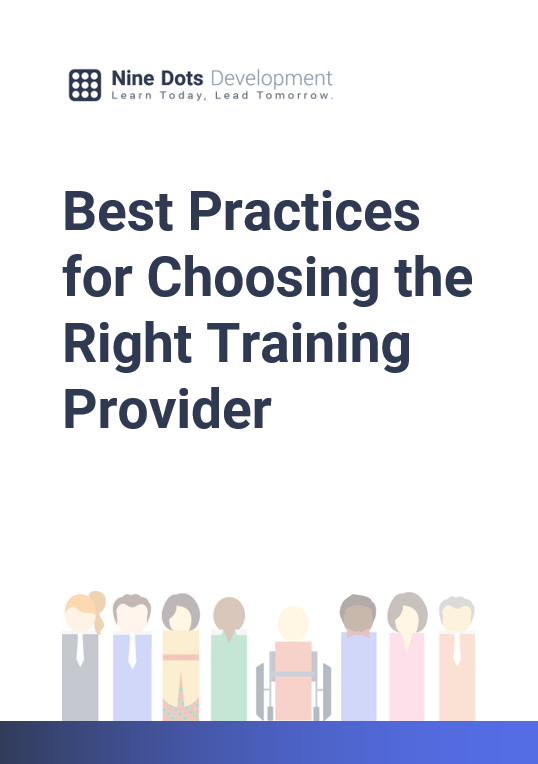Tuesday 30 May 2023 Article
The TakeawayThe Art of Choosing the Right Training Provider for Your New Managers’ Development
How to Overcome the Trials and Tribulations of First-time Management
Part 6
#StaffDevelopment #PluggingTheGap #BetterWorkplace #NewManagerTrainingCourse #NewManagerTrainingCourses #LeadershipAndManagementCourses #TeamDevelopment
The perfectly matched resource for this article...
Best Practices for Choosing the Right Training Provider
This quick PDF highlights 10 best practices to help you make sure that you're choosing the right training provider for your new managers.
Download!Playing catchup?
The Art of Choosing the Right Training Provider for Your New Managers’ Development
In today's business landscape, the role of a manager is crucial in driving team performance, fostering productivity, and achieving organisational goals. As organisations promote employees into managerial positions, providing them with effective training becomes paramount. However, selecting the right training provider for developing new managers can be a critical decision. In this article, we will delve into key considerations that organisations should take into account when choosing a training provider, specifically focused on developing the skills and capabilities of new managers within their organisation.
Assess the Provider's Managerial Expertise
When selecting a training provider for new managers, it is essential to assess their expertise in the field of managerial development. Look for providers who have a deep understanding of the challenges and responsibilities that new managers face. Review their experience in delivering training programs specifically designed for new managers and inquire about their success stories. A provider with proven expertise can offer insights, practical tools, and techniques that resonate with the unique needs of individuals transitioning into management roles.
Focus on Leadership and Communication Skills
Training programs for new managers should emphasise essential leadership and communication skills. Evaluate the training content to ensure it covers topics such as effective communication, conflict resolution, team building, decision-making, and strategic thinking. The provider should offer comprehensive modules that help new managers develop these critical competencies, enabling them to lead their teams confidently and navigate challenges successfully.

Look for Practical Application
To ensure the training is impactful, seek a provider that incorporates practical application into their programmes. New managers benefit greatly from hands-on exercises and real-life scenarios that simulate common workplace situations. Practical training allows them to apply newly acquired knowledge and skills in a safe and supportive environment. Case studies and role-playing activities can deepen their understanding of managerial concepts and enable them to practice effective decision-making and problem-solving.
Evaluate Feedback and Reviews
Before making a decision, be sure to look at feedback and reviews about the training provider and their programmes. Seek insights into the effectiveness of the training, the quality of delivery, and the provider's ability to meet specific objectives. Feedback can offer valuable perspectives and help gauge the provider's reputation and credibility in the field of managerial training.

Consider Customisation Options
Every organisation has its unique culture and requirements. Look for a training provider that offers customisation options to tailor the program to your organisation's needs. The ability to adapt the training content, incorporate company-specific examples, and address specific challenges faced by your new managers can significantly enhance the program's relevance and impact.
Conclusion
Selecting the right training provider for developing new managers is crucial to their success and the overall growth of your organisation. By considering factors such as the provider's expertise, focus on leadership and communication skills, practical application, and customisation options, you can ensure that your new managers receive the training they need to excel in their roles and contribute to organisational success.
Best Practices for Choosing the Right Training Provider
This quick PDF highlights 10 best practices to help you make sure that you're choosing the right training provider for your new managers.
Download!Missed an article?
More from How to Overcome the Trials and Tribulations of First-time Management
